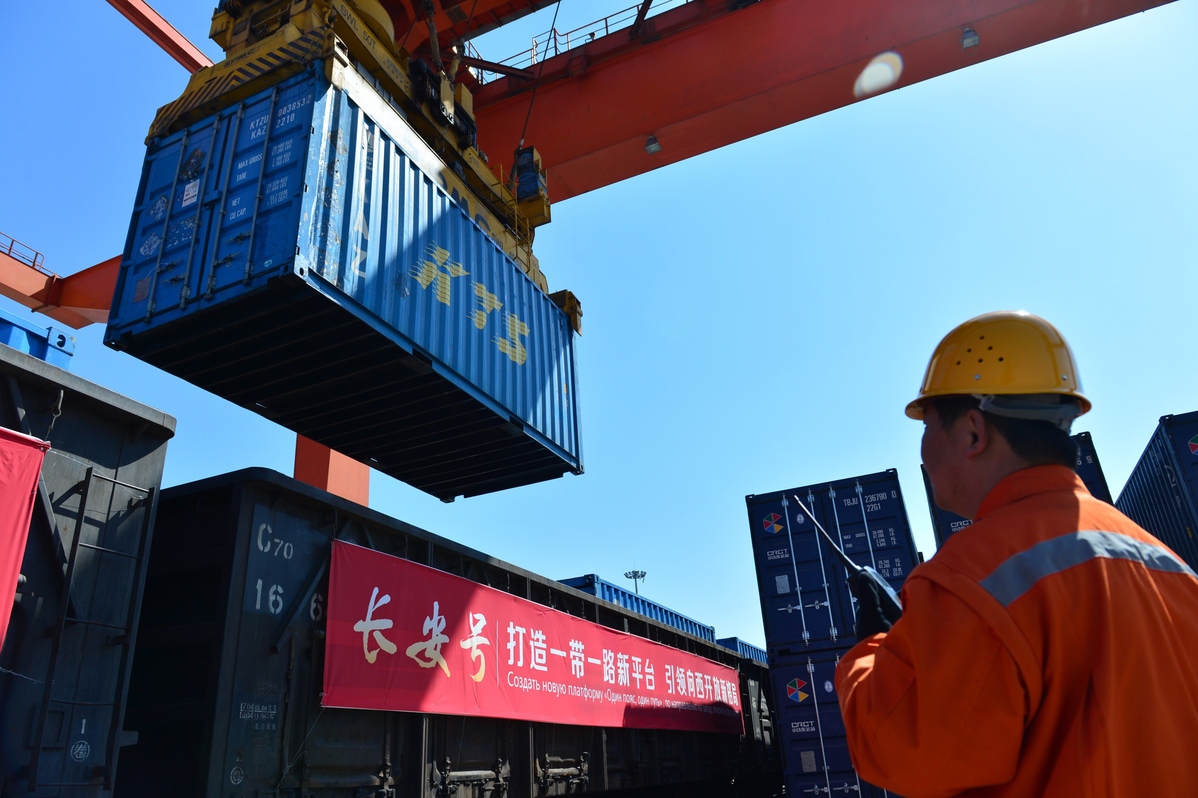Silk Road freight route becomes vital trade artery
By CHEN MEILING/HUO YAN | China Daily | Updated: 2018-04-20 07:46

Chang'an services, now increasingly heading both ways, help open western region
The international Chang'an rail freight route, which departs from Xi'an, has further opened western China to the outside world over the past five years, helping increase trade with nations in Central Asia and Europe.
Some 182 freight trains completed journeys on the route during the first quarter, seven times the number during the same period last year.
Most were carrying major Chinese exports such as mechanical equipment, spare parts and accessories, raw building materials, electronics, clothing and shoes to cities as far away as Hamburg, Budapest and Moscow.
Going the other way were imports of grain and oil from Kazakhstan, cotton yarn from Uzbekistan and wood from Russia, according to Liu Wei at the Xi'an International Trade and Logistics Park.
"Shaanxi people love to eat wheaten foods. Flour and other wheat foods brought from other countries can improve the diversity and quality of the dishes on their dining tables," he said.
Xi'an, the capital of Shaanxi province, was the starting point of the ancient Silk Road trading route. Today the city remains one of the country's largest inland ports.
The Chang'an route opened in 2013, shortly after the launch of the Belt and Road Initiative, and ranks No 2 in the China Railway Express freight network in terms of frequency of services. The goal is to run 1,000 trains along the route this year, according to Liu.
"The services can help the Xi'an area become a distribution hub for exports and imports nationwide, bringing in more companies looking to get involved in cross-border trade, and thus stimulating the western region's economic development," he said.
The CR Express network-seen as a logistics tool linking China and the world through the Belt and Road Initiative has witnessed a boom in interest in recent years.
More than 7,600 freight trains have set off from 43 Chinese cities bound for 41 European destinations using the network. The total number of services reached 1,000 in the first quarter, up 75 percent year-on-year, data from the network operator showed.
Initially, fully loaded trains were departing China and returning empty, causing concern over losses in profits and a cross-border trade imbalance. However, the latest official figures show the situation is improving, with 67 percent of outbound services during the first quarter returning with cargo, an increase of 17 percentage points on the same period in 2017.
The first Chang'an train to return with goods brought 1,000 metric tons of both rapeseed oil and sunflower seed oil from Kazakhstan in March 2016. The goods were ordered by Xi'an Aiju Grain and Oil Industry Group, which has been storing, processing and trading rice, wheat and oils for 80 years.
Aiju invested 110 million yuan ($17.5 million) in 2015 to build a planting base in Kazakhstan, just one of 51 Sino-Kazakh capacity cooperation projects, according to Liu Dongmeng, the company's deputy general manager.
He said the company has since purchased 50,000 tons of wheat and 30,000 tons of rapeseed and sunflower seeds from Kazakhstan for products to sell in China, part of efforts to boost Kazakh farmers' sales and bring more high-quality foods to Chinese consumers from a place with less pollution and rich agricultural resources.
"Kazakhstan's is one-fourth the size of China, but its population is only 18 million. Although agriculture is one of its pillar industries, many areas of land remain barren," he added.
Gulmira Issyeva, vice-minister of agriculture for Kazakhstan, said at a ceremony to mark the first Chang'an return trip in 2016 that his country hoped to export more beef, mutton, vegetables and fruit to China.
The Chang'an service takes about a week, according to Liu Dongmeng, who said before it was available, Aiju used to import oil from Russia, which took one and a half months.
The less time in transit, the lower the cost, both in terms of transportation and capital flow, Liu Wei at the Xi'an logistics park added. He said CR Express services are cheaper than by air and quicker than by sea, making it another choice for international traders.
























